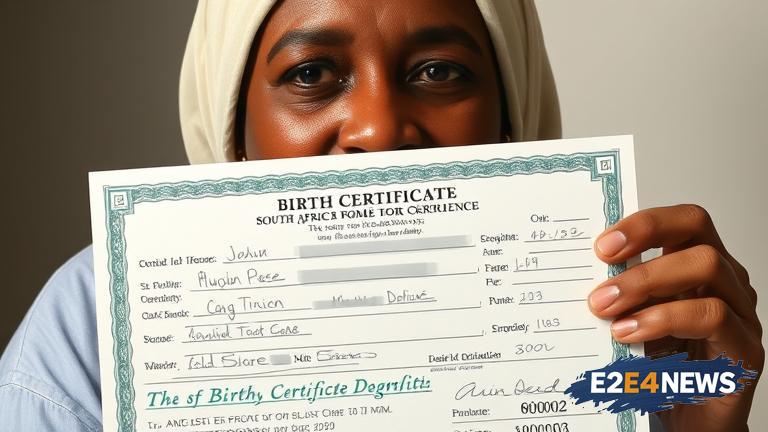Primose Modisane, a South African woman, has been fighting for her right to a birth certificate for decades. Despite her efforts, she was repeatedly denied the essential document, which is necessary for accessing various government services and benefits. The lack of a birth certificate had significant implications for Modisane’s life, making it challenging for her to obtain a national identity document, vote, or access social grants. The struggle for her birth certificate began when Modisane was a child, and her parents were unable to register her birth due to circumstances beyond their control. As she grew older, Modisane attempted to obtain her birth certificate, but her efforts were met with resistance from the relevant authorities. The Department of Home Affairs, responsible for issuing birth certificates, cited various reasons for denying Modisane’s application, including a lack of documentation and discrepancies in her personal details. Undeterred, Modisane continued to fight for her right to a birth certificate, seeking assistance from various organizations and individuals. Her case was eventually taken up by the Lawyers for Human Rights (LHR) organization, which provided her with legal representation and support. With the help of LHR, Modisane was able to take her case to court, where a judge ultimately ruled in her favor, ordering the Department of Home Affairs to issue her a birth certificate. The court’s decision was a significant victory for Modisane, who had been struggling for so long to obtain the document. The ruling also highlighted the importance of access to birth certificates and the need for the government to ensure that all citizens have access to this essential document. Modisane’s case has sparked widespread attention and debate, with many calling for reforms to the birth registration process to prevent similar struggles in the future. The South African government has been criticized for its handling of birth registration, with many citing bureaucratic inefficiencies and a lack of resources as major obstacles. In response to the criticism, the government has pledged to improve the birth registration process, including increasing funding and resources for the Department of Home Affairs. The case has also raised awareness about the importance of birth certificates and the impact that a lack of access to these documents can have on individuals and communities. Modisane’s story has inspired many, and her determination and perseverance in the face of adversity have been widely praised. The court’s decision has also been hailed as a major victory for human rights, highlighting the importance of access to essential documents and the need for governments to ensure that all citizens have access to these documents. As Modisane finally holds her birth certificate, she can now access various government services and benefits, including a national identity document, social grants, and the right to vote. The case has also sparked calls for greater awareness and education about the importance of birth registration and the need for individuals to ensure that their births are registered. In conclusion, Primose Modisane’s decades-long struggle for a birth certificate has finally come to an end, thanks to a court order. Her case has highlighted the importance of access to birth certificates and the need for governments to ensure that all citizens have access to these essential documents. The ruling has also sparked widespread attention and debate, with many calling for reforms to the birth registration process to prevent similar struggles in the future.
